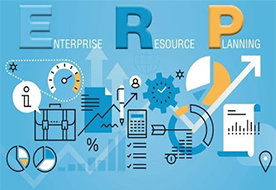
Equipped with new-age technologies such as Artificial Intelligence (AI), Internet of Things (IoT), Industrial Internet of Things (IIoT) and cloud computing the industry is currently experiencing the 4th industrial revolution significantly making it Industry 4.0. However, one of the important shortcomings the industry currently faces is faulty and unsuitable manufacturing development. In the present competitive market scenario, having an ideal manufacturing process for a business can ensure the minimization of errors as well as higher efficiency of production.
Adding to this, in from the year 2016 to 2020, the estimated cost reduction in various industries across the world is around 28 billion dollars. ERP software tool is considered to be the intermediary backbone of any enterprise, as it connects the different departments to form a single unique platform for the unperturbed flow of data. Also, the productivity achieved by the IIoT adopter’s results in a drop of 30 percent maintenance charges, 10 to 30 percent decreased production cost and 30 percent of logistics costs.
Useful in managing everyday business actions, ERP solutions assist the organizations in the automation of many business processes through a set of integrated applications. A kind of management software, ERP solutions ensure the accurate and error-free flow of data along with the management of various activities related to accounting, finance, production, sales, inventory and more.
Some of the key points are stated below, highlighting how the ERP solutions implemented in the manufacturing process can tackle the challenges of industry 4.0.
Similarly, a customer can request a last-minute alteration or replacement of products. By the efficient execution of the replacement orders ERP enables faster production of the required goods to avoid any kind of delay for the delivery of correct products. Similarly gathering information such as product delivery, pricing, delivery charge, discount and so on, the ERP updates the system to avoid any kind of misconception in the future.
Quality Management: The most vital factors of the industry are quality as the time and speed of the production are irrelevant if the quality of the manufactured goods doesn’t meet up the industry standards. Monitoring all the production work by tracing the manufactured goods through every phase of the manufacturing cycle, ERP facilitates corrective measures for any kind of defective products while the manufacture. Operating via IoT sensory networks, the faulty material is removed from the inventory eliminating the possibilities of liability issues and in recent years the quality management costs have reduced by 20 percent.